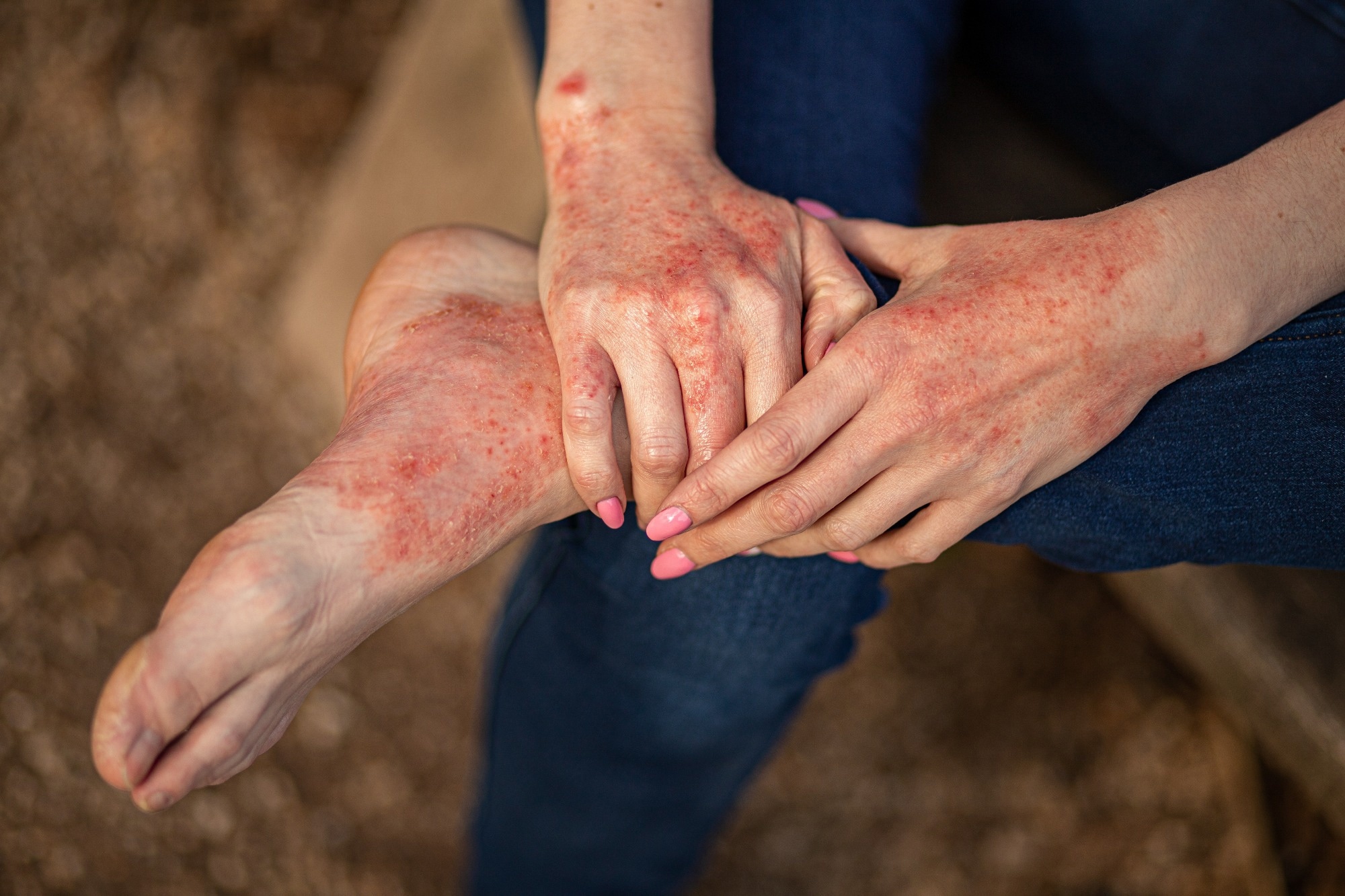
A report of a patient with atopic dermatitis published in the journal Nutrients highlights the importance of a healthy diet in reducing the symptoms of atopic dermatitis.
 Review: The role of Western diet in atopic dermatitis: our experience and review of the available literature. Image credit: IrinaFoto/Shutterstock.com
Review: The role of Western diet in atopic dermatitis: our experience and review of the available literature. Image credit: IrinaFoto/Shutterstock.com
Background
A balanced diet of healthy foods plays a key role in improving physical and mental health and reducing the risk of developing various adverse health conditions, including cardiometabolic diseases. Conversely, unhealthy foods that should be avoided or consumed in moderation can increase the risk of obesity, diabetes, and heart disease.
Worldwide, consumption of Western-style diets is increasing, often high in processed or highly processed foods, sugary drinks and animal products, and low in fiber, vitamins and minerals. At the same time, there is a general increase in morbidity and mortality.
Ultra-processed foods cause inflammation and have serious negative health effects. These foods can affect the gut microbiota and increase the number of pathogens responsible for inflammatory diseases. Real-world evidence shows that ultra-processed foods can significantly increase the risk of cardiovascular disease, cerebrovascular disease, and all-cause mortality.
Dietary exposure also plays a key role in the development of inflammatory skin diseases, including atopic dermatitis. This disease is characterized by recurring and itchy rashes that significantly reduce a person's overall quality of life. Gut microbiota plays an important role in the development of atopic dermatitis by regulating the maturation of the immune system, especially in the first years of life.
Studies focusing on dietary interventions for chronic diseases show that probiotics, prebiotics, vitamin and mineral supplements, and healthy eating habits can be effective in treating and preventing atopic dermatitis.
Medical history
The present study reports the case of a 14-year-old boy with a six-year history of eczematous skin lesions on various parts of the body suggestive of atopic dermatitis. The patient also suffered from asthma, sleep disorders and irritability. The patient was receiving long-term treatment with topical steroids and calcineurin inhibitors; however, no significant treatment effect was observed.
During the clinical examination of the patient, itchy eczematous rashes on the legs, as well as small wounds on the forearms and ears, as well as on the face of the patient were revealed. When scratching the affected areas of the body, a liquid sticky discharge was released. The patient reported worsening of symptoms at night and improvement of symptoms with the use of wet dressings.
On closer examination, the patient was found to have type 1 obesity, a low waist-to-hip ratio, and high fasting glucose levels. Based on these observations, the patient was diagnosed with metabolic syndrome. In addition, dietary assessment revealed that the patient was eating a predominantly Western diet.
After enrollment, the patient was treated with dupilumab, a monoclonal antibody targeting interleukin 13 (IL-13) and IL-4. After eight weeks of treatment, there was a partial improvement of the lower extremity lesions and a reduction in erythema, thickening of the skin and itching. However, no significant improvement in the patient's general quality of life was observed in the first re-examination.
However, dupilumab treatment was continued and the patient was finally evaluated after 18 weeks of treatment. During this follow-up, the patient had complete resolution of active lesions and no symptoms of pruritus or sleep disturbances.
The patient continued to experience hyperpigmentation on the upper extremities. Additional clinical evaluations showed a significant reduction in the patient's body weight and fasting blood glucose levels.
At the 18-week follow-up visit, the patient noted that she had visited a nutritionist one week after the first follow-up visit. A nutritionist prescribed a diet based on the Mediterranean diet, rich in vegetables, fruits and whole grains. The patient notes strict adherence to the prescribed diet.
Meaning
The case report presented in the current study highlights the importance of dietary regimens in enhancing the therapeutic efficacy of monoclonal antibodies for the treatment of inflammatory skin diseases such as atopic dermatitis.
In addition to its cardiometabolic benefits, the Mediterranean diet has well-established immunomodulatory effects. This case shows that dupilumab therapy combined with a Mediterranean diet is highly effective in completely relieving symptoms associated with atopic dermatitis.
Journal link:
- Ilaria P, Ersilia T, Nicoleta B , et al. (2023). The role of Western diets in atopic dermatitis: our experience and a review of the available literature. Nutrients doi:10.3390/nu15183896

